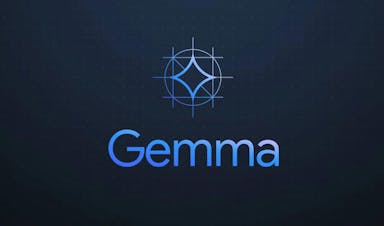From no-code side project to Zapier acquisition
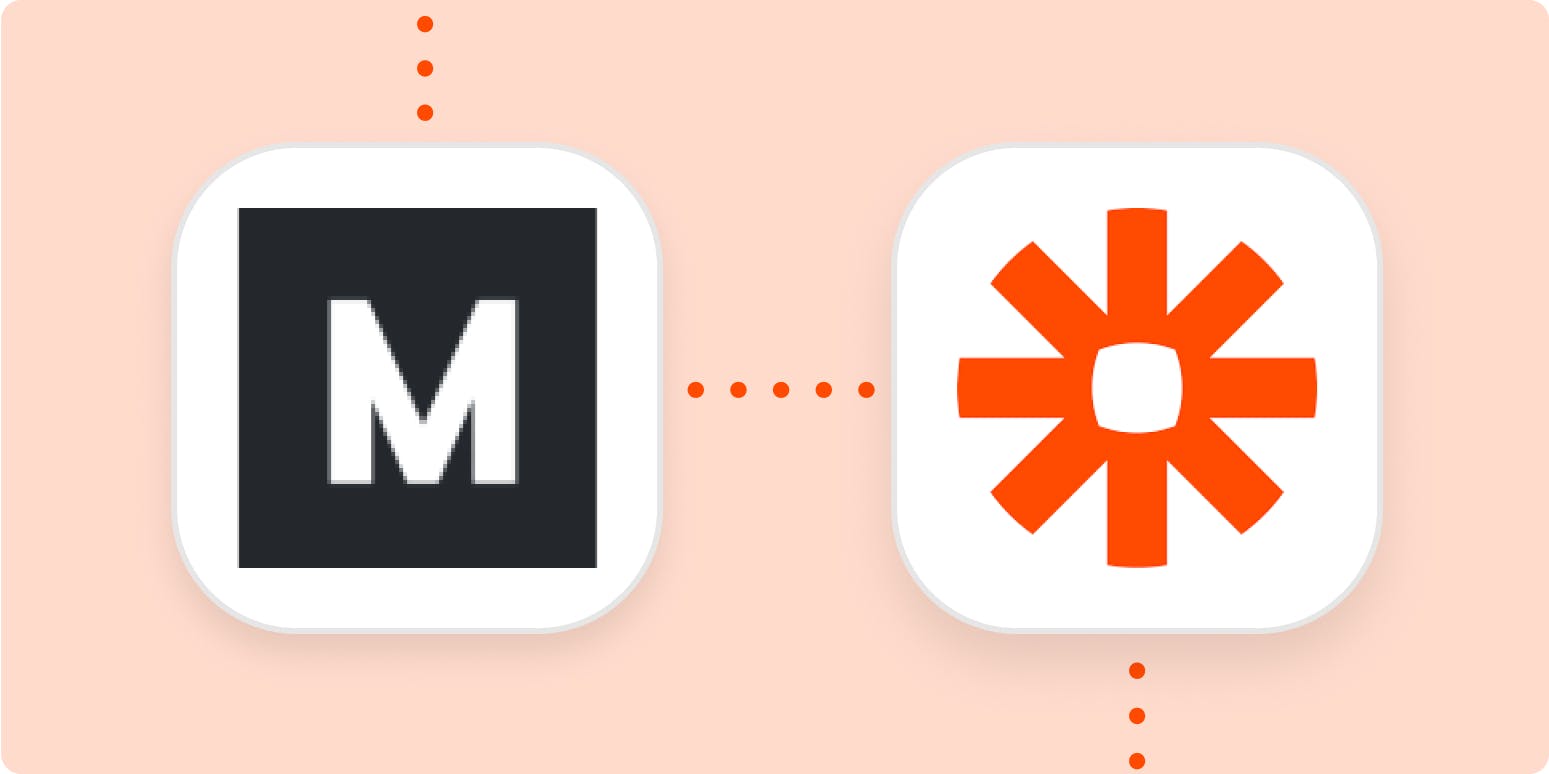
Inspired by makers, Ben Tossell started building with no-code. A realization led to approaching his side project differently. What he tapped into led to an acquisition of his company, Makerpad.
In early March, news broke of Zapier’s first acquisition, the no-code education platform and community, Makerpad.
Makerpad’s founder Ben Tossell recently talked with us about his journey from Product Hunt to acquisition, and that statement has extra meaning for Tossell. He joined the Product Hunt team as our Community Programs Manager back in 2015 before leaving to follow new opportunities, working on Makerpad as a side project until 2019 when he went all in.
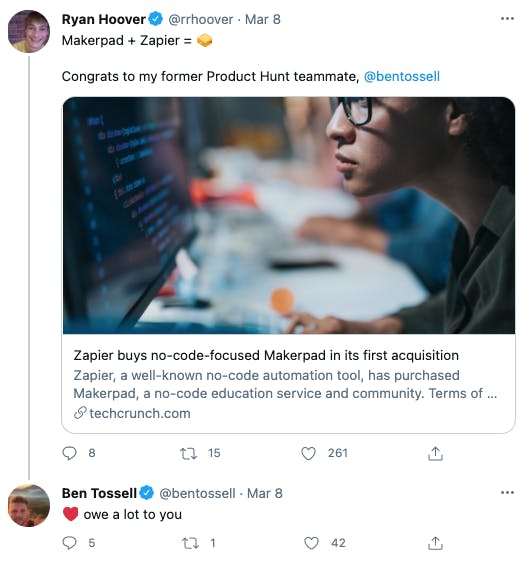

We were grateful for the reunion and broke down the highlights of Makerpad’s journey.
Catching the maker bug
Tossell’s early days at Product Hunt demonstrate how being part of a strong community taps into unforeseen interests. Earlier in his career Tossell assumed, being a generalist with lots of contacts in the industry, that his path would lead him to a role like Head of Platform at a venture fund.
Tossell told us that seeing all the makers around him build projects made him realize that’s what he wanted to do. The problem: he didn’t have the same technical expertise as other makers.
Fortunately, he wasn’t easily dissuaded. As he watched the launches of tools like Webflow, Typeform, and Zapier, he saw an opportunity to string them together and make something new. The first thing he created was a directory site for Alexa skills with tools like Card, Typeform, Zapier, and Google Sheets.
From then on, Tossell was looking through the maker lens. He built and launched products regularly. He told us that, in hindsight, his building wasn’t just a new hobby. At the time, on a subconscious level, he was hoping one of his projects would take off though he played it off to himself as scratching an itch.
From then on, Tossell was looking through the maker lens. He built and launched products regularly. He told us that, in hindsight, his building wasn’t just a new hobby. At the time, on a subconscious level, he was hoping one of his projects would take off though he played it off to himself as scratching an itch.
The pivot that paid off
You could call it striking on a good idea, but Makerpad’s start was really a substantial pivot from how Tossell started with building tools.
In perhaps self-deprecating British humor, Tossell told us that he mistakenly thought people were interested in all the things he was building — they were not. What he meant was that his services hadn’t sold at all. However, he picked up cues about what people were actually interested in: how he was building.
Around the same time, he read about someone on Indie Hackers who was making $15K a month with Ruby on Rails tutorials. That helped him connect his realization that people wanted to see him build with no-code, with the idea for a business model. He used Product Hunt’s Ship tool to let community members know that he would be creating a handful of tutorials on how he built with no-code, offering a lifetime membership. About fifteen people signed up. As Tossell said, “There’s no better motivation than when someone has already given you money.”
He built a simple platform, using tools like Typeform to get sign-ups and embedded Looms in a password-protected page, to launch his no-code education videos. That was the start of Makerpad.
Going all-in on his startup
Makerpad stayed a side-project of Tossell's for around 9 months while he took on a job as Head of Platform at Earnest Capital which provides early-stage funding to startups. When the company got to the point where it was achieving $30K in monthly revenue, lots of people were taking notice. Tossell started to receive inquiries about selling Makerpad and people like Tyler Tringas, General Partner at Earnest Capital, gave him a vote of confidence that he could leave to pursue Makerpad’s growth full time.
Once he took the plunge, Tossell did a small round of fundraising, collecting $350K from angel investors including Earnest Capital. He immediately hired a couple of people from the maker community, noting it was such an obvious choice since they understand the value prop of what Makerpad is. The team started producing a ton of content, growing their base organically.
The acquisition by Zapier
By this point in Makerpad’s growth (2020), the company was getting partner revenue from Zapier and Tossell had met co-founder Wade Foster at a no-code conference in San Francisco. Tossell tweeted, as he often did, an interesting bit of information. His tweet highlighted the top ten tools that makers were using on Makerpad and, unsurprisingly, Zapier was one of them.
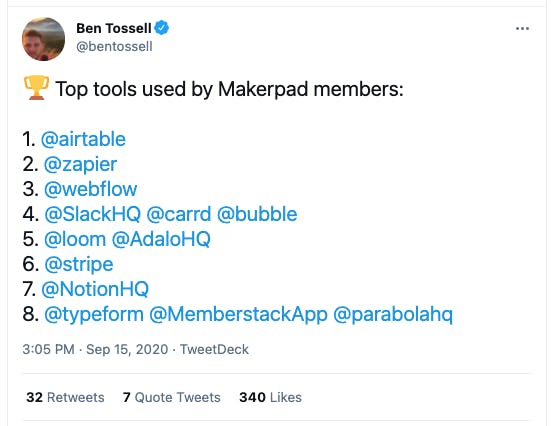

A retweet with a suggestion for Airtable or Zapier to buy Makerpad caught Foster's attention at Zapier. He reached out to Tossell and about five months later the acquisition was complete.
One of the things that Tossell and Foster have had in common from the start is their resistance to pursue VC funding. Zapier had made only one fundraising round back in 2012 and has since steered the company to be reliant on driving its own ARR, preferring to focus on customers over fundraising.
Tossell told us that Makerpad will continue to run as an independent entity, with the benefit of reaching his and Zapier’s shared goal of reaching more people, faster. Tossell hopes Makerpad will continue running on its own engine, noting that the natural overlap between the two companies is huge — something like half of Makerpad members are already Zapier users. He envisions that Makerpad builders using Zapier will evolve from using one zap to ten.
The future of no-code
I don’t want to see ‘no-code.’ I hope it’s not around.
Tossell told us: “I hope it’s so ingrained in the conversation of software development that we don’t think of it as no-code. If my parents go to look up how to build a website, they’re not typing in ‘How to build a website with code’ and then again ‘without code.’"
Tossell sees no-code as part of the spectrum of software development, where no-code is a jumping-off point for understanding the pieces of how technologies work together. He admitted he’s not entirely sure how it happens, but views this shift in perspective as critical to the democratization of software development.
On building Makerpad's community
Tossell told us that one question he gets a lot is how to build community, but has found the question is often loaded with perceptions that community is Twitter followers or a forum. Community, for him, is not how many people are in your forum.
In fact, Tossell acknowledges that if people become so good at no-code, they’ll use Makerpad less and less, which would seem contradictory to those kinds of definitions of community. Instead, he believes it's a collection of shared experiences and conversations that bleed across channels online and offline. "If makers think of Makerpad when they think of no-code — that’s community."
–
Comments (6)
Henry Fieldse
Molly Chopps
love books
Molly Chopps
love books
mike taylor
writer at greatassignmenthelper.com
John Wilson
freelancer
More stories
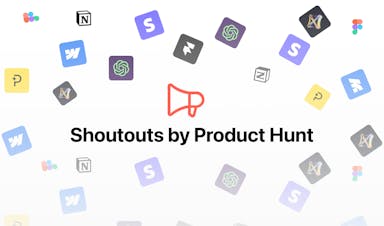
Aaron O'Leary · Announcements · 2 min read
Introducing Shoutouts
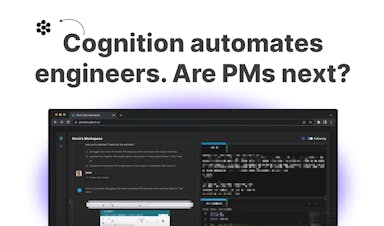
Finn Lobsien · Opinions · 5 min read
Can Devin AI Replace Product Managers?
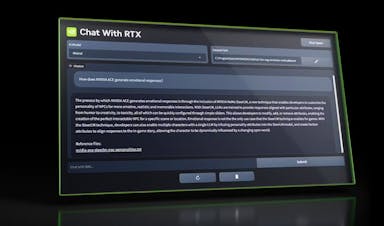
Aaron O'Leary · News · 2 min read
Meet Nvidia's new localized AI chatbot
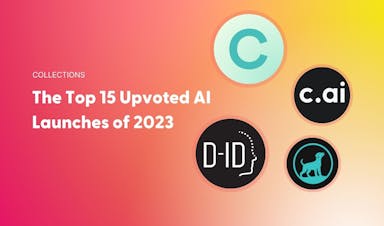
Sarah Wright · News · 2 min read
The top 15 AI products from 2023

